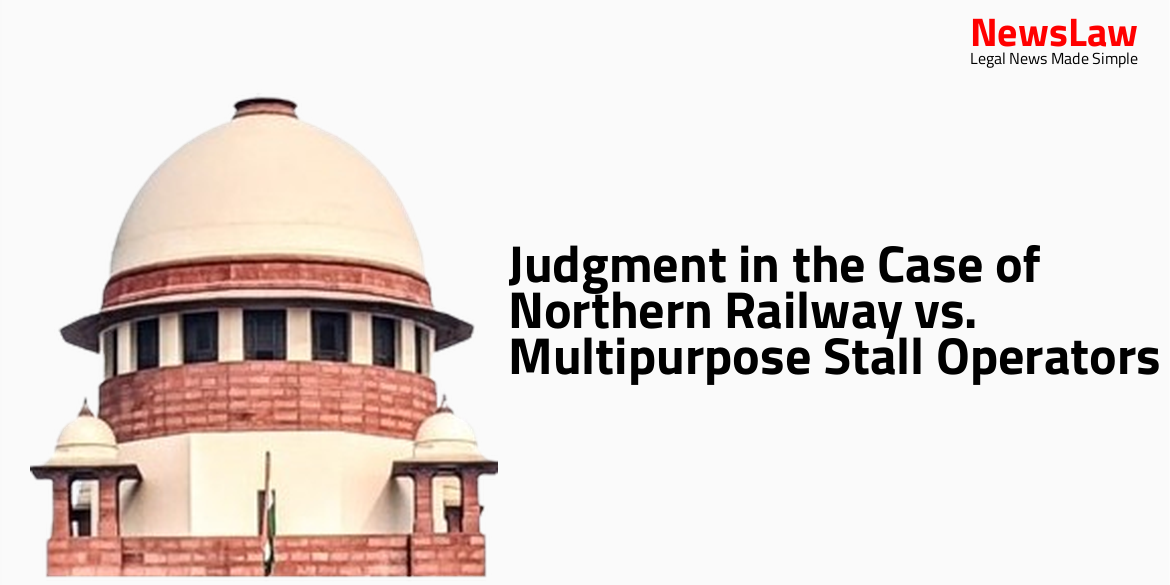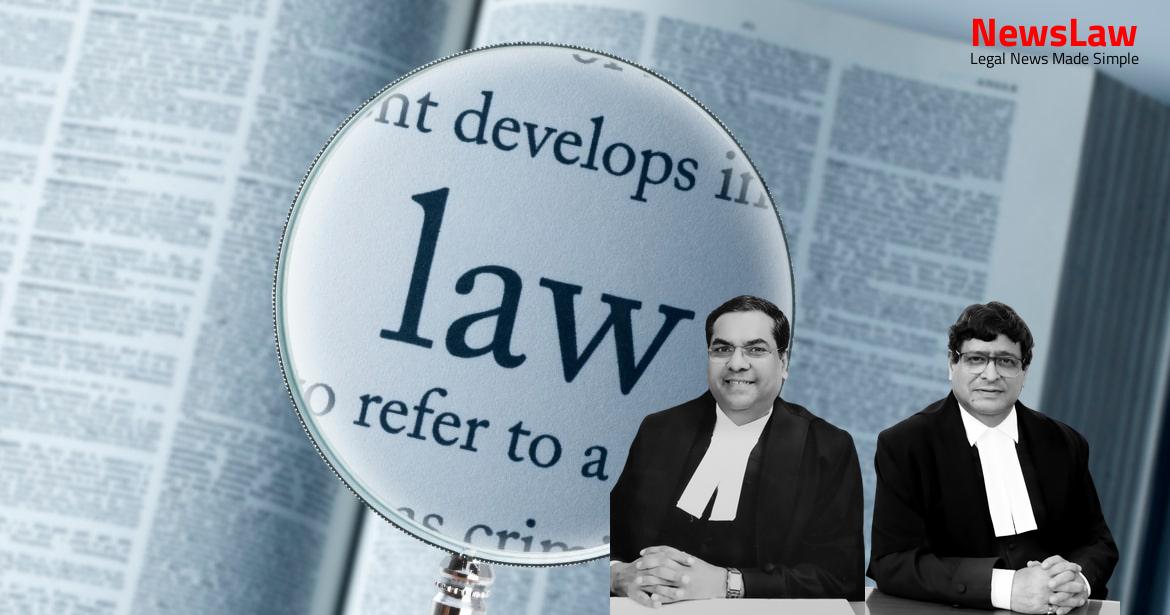The Delhi High Court recently delivered a significant judgment in the case of Northern Railway vs. Multipurpose Stall Operators. The dispute involves the operators of multiple MPS units at various railway stations. The court’s decision addresses the legality and application of the 2017 Policy, particularly regarding the renewal and extension of licenses for the MPS operators. Let’s delve into the details of this case and understand the implications of the court’s ruling.
Facts
- The petitioners were directed to vacate their MPS by 27.02.2023 due to Covid-19 lockdown.
- Petitioner 1 operates three MPS at Bareilly Railway Station, Petitioner 2 operates one MPS at Moradabad Railway Station, and Petitioner 3 operates one MPS at Haridwar Railway Station.
- The petitioners were forced to convert their stalls/trolleys to MPS by Northern Railway in 2017.
- Different Master License Agreements were executed between the petitioners and Northern Railway on various dates.
- The tenure of the petitioners’ licenses was until 21.12.2022, as per the agreements with no provision for extension or renewal.
Arguments
- The petitioners argue that their licenses have expired by efflux of time and they have no right to compel the respondents to extend them.
- They claim that the 2017 Policy is legally sound and non-arbitrary, applicable universally without discrimination.
- They highlight a Karnataka High Court judgment dismissing a similar challenge against the 2017 Policy.
- The petitioners’ licenses are governed by the 2017 Policy which clearly states no renewal or extension of license.
- They argue that the petitioners had benefited from the 2017 Policy’s tenure of five years and cannot challenge it now.
- They cite cases to support their argument that the 2017 Policy should continue to govern licenses allotted before its issuance.
- The petitioners are accused of being beneficiaries of the new policy but trying to challenge it at the end of the tenure.
- They claim that Clause 5 of the 2017 Policy violates constitutional rights by prohibiting license renewal.
- The petitioners have a legitimate expectation for license renewal based on past practices and lack of tender processes.
- They refer to relevant cases to support their expectation of license renewal.
- The petitioners argue that the lack of license renewal for stalls/trolleys while renewing small catering units is arbitrary.
- They raise concerns about the extension of contracts during COVID-19 and demand similar treatment for license extensions.
- Relevant cases are cited to support their arguments regarding coercion and unequal bargaining positions.
- The petitioners argue that the courts have jurisdiction over the petitions and raise objections to the exclusive jurisdiction clause in license agreements.
- They emphasize on the fairness of the 2017 Policy in preventing monopolization and providing equal opportunities.
- The balance between the right to livelihood and equal opportunity under the 2017 Policy is highlighted.
- The petitioners claim that they voluntarily submitted their applications for conversion to MPS units under the 2017 Policy.
- The petitioner cannot claim ignorance as the contract clearly indicated a non-renewable period of five years, which the petitioner agreed to.
- The petitioner enjoyed the benefits of the contract for the entire five-year period.
- The petitioner cannot now seek to revert to previous policies that are no longer applicable to their current contract.
- The Supreme Court judgment referred to by the petitioner pertained to Catering Policy, not the Multipurpose Stall Policy in question.
- The petitioner cannot try to benefit by going back on the contract terms after its completion.
- The disputed policies are different from the one under which the petitioner’s contract operates.
Analysis
- The petitioners’ contention of being compelled to convert their stalls/trolleys to MPS is considered untenable.
- The Supreme Court’s decision in the case of General Minor Unit or Special Minor Unit licensees regarding contract renewals under the 2010 Catering Policy does not apply directly to the current case.
- The 2017 Policy explicitly states no extension or renewal of MPS units, allowing only fresh bids if the eligibility criteria are met.
- The doctrine of legitimate expectation cannot be claimed as a right itself but can be used if the denial leads to a violation of Article 14 of the Constitution.
- The jurisdiction of the Court to entertain the writ petitions is based on the authority to whom the writ is issued being located within its territorial limits.
- The concerned zonal/divisional railways determined the non-operational period based on ground realities and extended the license periods accordingly.
- The petitioners had ample opportunity to protest the conversion of their stalls/trolleys to MPS in the past few years but did not do so.
- Implementation of Force Majeure clause in catering and vending contracts due to the lockdown was advised to be carried out regardless of the presence of the clause in agreements.
- Original Names should be used in the judgment.
- The extract provided is from point 55 of the judgment.
- This part may contain important information regarding the case.
- The Karnataka High Court rejected a challenge to the 2017 Policy in the case of Gulfeeza Begum v. Union of India.
- The court noted that past relaxations in policy due to examination pattern changes do not entitle participants to claim similar assistance as a right.
- A writ of Mandamus cannot be used to direct the enactment of laws or framing of rules, except for enforcement of fundamental or statutory rights.
- Judicial review of a policy decision differs from mandamus to frame policy in a specific manner.
- A legitimate expectation may not always lead to relief if public interest, policy changes, or valid reasons by decision-makers negate it.
- Public bodies cannot arbitrarily decline license renewals without rational or compelling reasons.
- Individual license agreements and the 2017 Policy contain an arbitration clause for grievances related to insufficient extension due to Covid-19.
- Petitioners can claim damages by invoking the arbitration clause and initiating appropriate proceedings.
Decision
- Existing bookstalls, tables, misc. stalls, chemist stalls have the option to convert to Multipurpose Stalls (MPS) by paying the quoted License Fee.
- No new allotments or renewals for existing stalls/trolleys will be done by the railways for now.
- For existing licensees, two options were provided: conversion to MPS with a 5-year tenure or continuation until the existing agreement/expires.
- A 3-month period granted for existing stall operators to vacate the premises after opting to convert to MPS.
- The 2017 MPS Policy advantages led the petitioners to choose conversion over continuation of their existing stalls/trolleys.
- The petitioners in W.P.(C) 2501/2023 requested conversion of their miscellaneous stalls/trolleys to MPS.
- The petitions were dismissed, but rights and remedies of the petitioners were kept open.
- All pending applications were disposed of, and the petitions were deemed maintainable for adjudication.
- The zonal railways being Northern Railway and common issues across petitions led the Court to entertain and adjudicate the matters.
Case Title: RAJESH JESWANI Vs. UNION OF INDIA & ORS. (2024:DHC:4452)
Case Number: W.P.(C)-10847/2023



